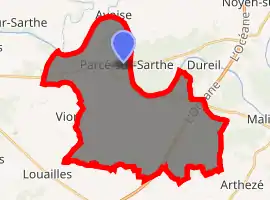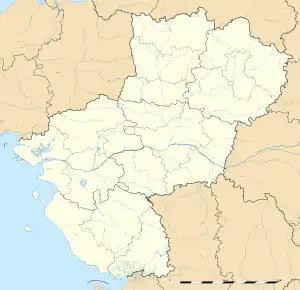Parcé-sur-Sarthe
Parcé-sur-Sarthe is a commune in the Sarthe department in the region of Pays de la Loire in north-western France.
Parcé-sur-Sarthe | |
|---|---|
.jpg.webp) The centre of Parcé-sur-Sarthe | |
.svg.png.webp) Coat of arms | |
Location of Parcé-sur-Sarthe 
| |
 Parcé-sur-Sarthe  Parcé-sur-Sarthe | |
| Coordinates: 47°50′32″N 0°11′59″W | |
| Country | France |
| Region | Pays de la Loire |
| Department | Sarthe |
| Arrondissement | La Flèche |
| Canton | Sablé-sur-Sarthe |
| Intercommunality | Communauté de communes de Sablé-sur-Sarthe |
| Government | |
| • Mayor (2014–2020) | Michel Gendry |
| Area 1 | 38.99 km2 (15.05 sq mi) |
| Population (2017-01-01)[1] | 2,100 |
| • Density | 54/km2 (140/sq mi) |
| Demonym(s) | Parcéen, Parcéenne |
| Time zone | UTC+01:00 (CET) |
| • Summer (DST) | UTC+02:00 (CEST) |
| INSEE/Postal code | 72228 /72300 |
| Elevation | 26–57 m (85–187 ft) |
| 1 French Land Register data, which excludes lakes, ponds, glaciers > 1 km2 (0.386 sq mi or 247 acres) and river estuaries. | |
Personalities linked to the commune
- François Villon (1431-1463), poet, briefly imprisoned there as testified by a plaque.
- Claude Chappe (1763-1805), inventor of the semaphore telegraph. He made his first attempts passing messages between Brûlon and Parcé.
- Joseph-René Verdier (born 1819 in Parcé-sur-Sarthe - 1904), watercolourist and student of Auguste and Rosa Bonheur. His works include Étang au crépuscule, Petite Fille jouant avec un chien et Un Matin dans la lande (Musée du Mans).
- Marcel Pagnol (1895-1974), novelist, playwright and filmmaker, bought the Ignière mill in 1930, where he stayed, and which he sold twenty years later. Le Gendre de Monsieur Poirier was partly filmed in the region.
- François Dufeu (born in 1943 in Parcé), writer.
See also
References
- "Populations légales 2017". INSEE. Retrieved 6 January 2020.
| Wikimedia Commons has media related to Parcé-sur-Sarthe. |
This article is issued from Wikipedia. The text is licensed under Creative Commons - Attribution - Sharealike. Additional terms may apply for the media files.